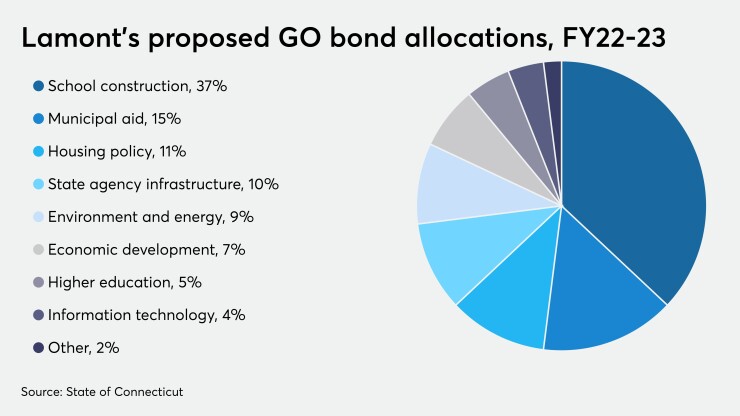Connecticut has become the latest state to consider legalized marijuana and sports betting.
Gov. Ned Lamont, in his $46 billion biennial
These include the lingering pandemic and uncertainty over federal aid, high fixed costs including pension liability and a projected deficit of $1.2 billion for each of the next two years. Lamont, a Democrat beginning his third year as governor, intends to whittle at the gap through expected rescue aid payments, the state's rainy-day fund and efficiency-related savings.
Fiscal 2022 starts July 1.
While calling for no broad-based taxes, Lamont suggested a tractor trailer mileage-based fee, akin to New York and Oregon. The mileage fee, he said, could raise $90 million annually, which could enable Connecticut to leverage for $1 billion worth of projects over five years.
Neighboring Massachusetts is offering legalized recreational marijuana and heavily advertising its availability in Connecticut. New York Gov. Andrew Cuomo has proposed similar legislation. Lamont said the alternative to legalizing its use is to "surrender this market to out-of-staters, or worse, to the unregulated underground market.”

These revenues, he said, will go to distressed communities, many of which have drug problems. Half the tax revenues should be allocated to a PILOTs fund, or payments in lieu of taxes. The governor called for automatically erasing criminal records for those with marijuana-related drug possession convictions and charges.
Matching other states is also behind Lamont's sports betting proposal. He said his administration has been negotiating with in-state tribal nations over digital enhancements. His plan calls for the operation of sports betting, e-sports and daily fantasy contests both on and off of tribal lands; the operation of online casino gaming within the state; and online operation of Keno within the state.
Lamont said a $775 million withdrawal from the stabilization, or rainy-day fund, would leave Connecticut with about $2.8 billion in reserve, or 13.4% of the general fund budget going into fiscal 2023.
The capital budget proposes new general obligation bond authorizations of $1.4 billion each year of the biennium, and special tax obligation transportation infrastructure bond authorizations of $736.9 million for fiscal 2022 and $929.6 million for fiscal 2023.

S&P Global Ratings and Moody's Investors Service rate Connecticut GOs A1 and A, respectively. Fitch Ratings and Kroll Bond Rating Agency assign respective ratings of A-plus and AA-minus.
Lamont’s truck-fee strategy replaces a proposal for highway tolling, which he had called for the past two years. He also suggested the state join the multi-state Transportation and Climate Initiative consortium, which he said would raise more than $80 million for public transit investment through a wholesale tax on gasoline.
“This policy's revenues may be used for expanded operations, flexing funding to leverage future federal grants and stimulus dollars, and invest in clean transportation across the state,” said Lauren Bailey, director of climate policy for the Tri-State Transportation Campaign. “This is a critical opportunity for recurring funding, reducing the state's reliance on one-shot funding to keep transit and the entire transportation system operational.”
While the plan would earmark $200 million to cities and towns primarily from the federal stimulus passed in December, it would withhold a $377 million transfer to municipalities from sales and use tax receipts and suspend a 10-year program to boost education grants to localities.
“I appreciate that the governor’s proposed budget includes allocations of emergency relief funds for Hartford and other municipalities, and that funding is much needed,” Hartford Mayor Luke Bronin said. “That said, I do have some concerns about using one-time revenue to accomplish that goal, as the fiscal challenges here and in many Connecticut communities are structural and long-term, and won’t go away when the pandemic is past.”
New Haven Mayor Justin Elicker said his city, which is home to Yale University and its large swath of tax-free property, needs a large infusion of PILOT revenue. “I intend to work with our partners in the legislature to see that these dollars are secured,” he said.
New Haven, according to Elicker, is facing a $66 million deficit for FY22. “The governor’s inclusion of an additional $11.8 million for New Haven in the budget does not come close to addressing the financial challenges our city faces.”





